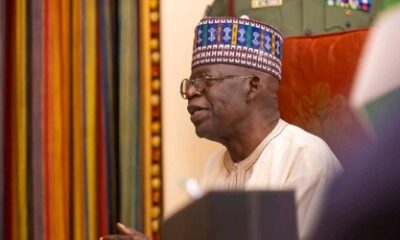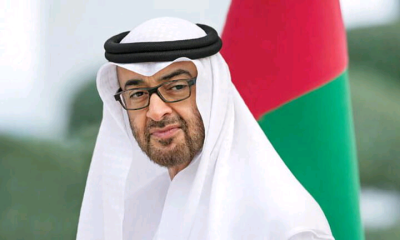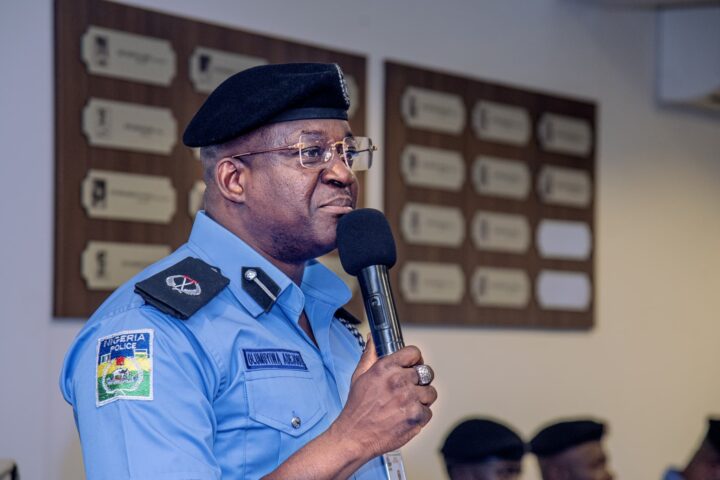
My compatriots,
It is one year today since our administration came into office. It has been a year of triumph, consolidation, pains and achievements. By age, instinct and experience, my preference is to look forward, to prepare for the challenges that lie ahead and rededicate the administration to the task of fixing Nigeria. But I believe we can also learn from the obstacles we have overcome and the progress we made thus far, to help strengthen the plans that we have in place to put Nigeria back on the path of progress.
We affirm our belief in democracy as the form of government that best assures the active participation and actual benefit of the people. Despite the many years of hardship and disappointment the people of this nation have proved inherently good, industrious tolerant, patient and generous.
The past years have witnessed huge flows of oil revenues. From 2010 average oil prices were $100 per barrel. But economic and security conditions were deteriorating. We campaigned and won the election on the platform of restoring security, tackling corruption and restructuring the economy. On our arrival, the oil price had collapsed to as low as $30 per barrel and we found nothing had been kept for the rainy day. Oil prices have been declining since 2014 but due to the neglect of the past, the country was not equipped to halt the economy from declining.
The infrastructure, notably rail, power, roads were in a decrepit state. All the four refineries were in a state of disrepair, the pipelines and depots neglected.
Huge debts owed to contractors and suppliers had accumulated. Twenty-seven states could not pay salaries for months. In the north-east, Boko Haram had captured 14 local governments, driven the local authorities out, hoisted their flags. Elsewhere, insecurity was palpable; corruption and impunity were the order of the day. In short, we inherited a state near collapse.
On the economic front, all oil dependent countries, Nigeria included, have been struggling since the drop in prices. Many oil rich states have had to take tough decisions similar to what we are doing. The world, Nigeria included has been dealing with the effects of three significant and simultaneous global shocks starting in 2014:
A 70% drop in oil prices.
Global growth slowdown.
Normalization of monetary policy by the United States federal reserve.
Our problems as a government are like that of a farmer who in a good season harvests ten bags of produce. The proceeds enable him to get by for rest of the year. However, this year he could only manage 3 bags from his farm. He must now think of other ways to make ends meet.
From day one, we purposely set out to correct our condition, to change Nigeria. We reinforced and galvanized our armed forces with new leadership and resources. We marshaled our neighbours in a joint task force to tackle and defeat Boko Haram. By the end of December 2015, all but pockets and remnants had been routed by our gallant armed forces. Our immediate focus is for a gradual and safe return of internally displaced persons in safety and dignity and for the resumption of normalcy in the lives of people living in these areas.
EFCC was given the freedom to pursue corrupt officials and the judiciary was alerted on what Nigerians expect of them in the fight against corruption. On the economy, in particular foreign exchange and fuel shortages, our plan is to save foreign exchange by fast tracking repair of the refineries and producing most of our fuel requirements at home. And by growing more food in Nigeria, mainly rice, wheat and sugar we will save billions of dollars in foreign exchange and drastically reduce our food import bill.
We resolved to keep the Naira steady, as in the past, devaluation had done dreadful harm to the Nigerian economy. Furthermore, I supported the monetary authority’s decision to ensure alignment between monetary policy and fiscal policy. We shall keep a close look on how the recent measures affect the Naira and the economy. But we cannot get away from the fact that a strong currency is predicated on a strong economy. And a strong economy pre-supposes an industrial productive base and a steady export market. The measures we must take, may lead to hardships. The problems Nigerians have faced over the last year have been many and varied. But the real challenge for this government has been reconstructing the spine of the Nigerian state. The last twelve months have been spent collaborating with all arms of government to revive our institutions so that they are more efficient and fit for purpose:
That means a bureaucracy better able to develop and deliver policy
That means an independent judiciary, above suspicion and able to defend citizen’s rights and dispense justice equitably.
That means a legislature that actually legislates effectively and
Above all; that means political parties and politicians committed to serving the nigerian people rather than themselves.
These are the pillars of the state on which democracy can take root and thrive. But only if they are strong and incorruptible. Accordingly, we are working very hard to introduce some vital structural reforms in the way we conduct government business and lay a solid foundation on which we can build enduring change.
An important first step has been to get our housekeeping right. So we have reduced the extravagant spending of the past. We started boldly with the treasury single account, stopping the leakages in public expenditure.
We then identified forty-three thousand ghost workers through the Integrated Payroll and Personnel Information system. That represents pay packets totalling N4.2 billion stolen every month. In addition, we will save Twenty-Three Billion Naira per annum from official travelling and sitting allowances alone.
Furthermore, the efficiency unit will cut costs and eliminate duplications in ministries and departments. Every little saving helps. The reduction in the number of ministries and work on restructuring and rationalization of the MDAs is well underway. When this work is complete we will have a leaner, more efficient public service that is fit for the purpose of changing nigeria for the good and for good.
As well as making savings, we have changed the way public money is spent. In all my years as a public servant, I have never come across the practice of padding budgets. I am glad to tell you now we not only have a budget, but more importantly, we have a budget process that is more transparent, more inclusive and more closely tied to our development priorities than in the recent past. 30% of the expenditure in this budget is devoted to capital items. Furthermore, we are projecting non-oil revenues to surpass proceeds from oil. Some critics have described the budget exercise as clumsy. Perhaps. But it was an example of consensus building, which is integral to democratic government. In the end we resolved our differences.
We have, therefore, delivered significant milestones on security, corruption and the economy. In respect of the economy, I would like to directly address you on the very painful but inevitable decisions we had to make in the last few weeks specifically on the pump price of fuel and the more flexible exchange rate policy announced by the central bank. It is even more painful for me that a major producer of crude oil with four refineries that once exported refined products is today having to import all of its domestic needs. This is what corruption and mismanagement has done to us and that is why we must fight these ills.
As part of the foundation of the new economy we have had to reform how fuel prices had traditionally been fixed. This step was taken only after protracted consideration of its pros and cons. After comprehensive investigation my advisers and I concluded that the mechanism was unsustainable.
We are also engaged in making recoveries of stolen assets some of which are in different jurisdictions. The processes of recovery can be tedious and time consuming, but today I can confirm that thus far: significant amount of assets have been recovered. A considerable portion of these are at different stages of recovery. Full details of the status and categories of the assets will now be published by the Ministry of Information and updated periodically. When forfeiture formalities are completed these monies will be credited to the treasury and be openly and transparently used in funding developmental projects and the public will be informed.
On the Niger Delta, we are committed to implementing the United Nations Environment Programme report and are advancing clean-up operations. I believe the way forward is to take a sustainable approach to address the issues that affect the delta communities. Re-engineering the amnesty programmes is an example of this. The recent spate of attacks by militants disrupting oil and power installations will not distract us from engaging leaders in the region in addressing Niger Delta problems. If the militants and vandals are testing our resolve, they are much mistaken. We shall apprehend the perpetrators and their sponsors and bring them to justice.
The policy measures and actions taken so far are not to be seen as some experiment in governance. We are fully aware that those vested interests who have held Nigeria back for so long will not give up without a fight. They will sow divisions, sponsor vile press criticisms at home and abroad, incite the public in an effort to create chaos rather than relinquish the vice-like grip they have held on Nigeria.
The economic misfortune we are experiencing in the shape of very low oil prices has provided us with an opportunity to restructure our economy and diversify. We are in the process of promoting agriculture, livestocks, exploiting our solid mineral resources and expanding our industrial and manufacturing base. That way, we will import less and make the social investments necessary to allow us to produce a large and skilled workforce.
Central Bank of Nigeria will offer more fiscal incentives for business that prove capable of manufacturing products that are internationally competitive. We remain committed to reforming the regulatory framework, for investors by improving the ease of doing business in Nigeria.
Meanwhile, the first steps along the path of self-sufficiency in rice, wheat and sugar – big users of our scarce foreign exchange – have been taken. The Labour Intensive Farming Enterprise will boost the economy and ensure inclusive growth in long neglected communities. Special intervention funds through the Bank of Agriculture will provide targeted support. Concerns remain about rising cost of foods such as maize, rice, millet, beans and gari. Farmers tell me that they are worried about the cost of fertilizers, pesticides and the absence of extension services. The federal and state governments are on the same page in tackling these hurdles in our efforts at increased food production and ultimately food security.
I would like to take this opportunity to express my appreciation for the increasing role that our women are playing in revitalizing the agricultural sector. Modern farming is still hard and heavy work and I salute our Nigerian women in sharing this burden. In this respect I am very pleased to announce that the government will shortly be launching the national women’s empowerment fund, which I have approved to provide N1.6 billion in micro-finance loans to women across the nation to assist in rehabilitating the economies of rural communities, particularly those impacted by the insurgency and conflict.
With respect to solid minerals, the minister has produced a roadmap where we will work closely with the world bank and major international investors to ensure through best practices and due diligence that we choose the right partners. Illegal mining remains a problem and we have set up a special security team to protect our assets. Special measures will be in place to protect miners in their work environment.
For too long, ours has been a society that neglects the poor and victimizes the weak. A society that promotes profit and growth over development and freedom. A society that fails to recognize that, to quote the distinguished economist Amartya Sen “ poverty is not just lack of money. It is not having the capability to realize one’s full potential as a human being.”
So, today, I am happy to formally launch, by far the most ambitious social protection programme in our history. A programme that both seeks to start the process of lifting many from poverty, while at the same time creating the opportunity for people to fend for themselves. In this regard, Five Hundred Billion Naira has been appropriated in the 2016 budget for social intervention programmes in five key areas. We are committed to providing job creation opportunities for five hundred thousand teachers and one hundred thousand artisans across the nation. 5.5 million children are to be provided with nutritious meals through our school feeding programme to improve learning outcomes, as well as enrolment and completion rates. The conditional cash transfer scheme will provide financial support for up to one million vulnerable beneficiaries, and complement the enterprise programme – which will target up to one million market women; four hundred and sixty thousand artisans; and two hundred thousand agricultural workers, nationwide. Finally, through the education grant scheme, we will encourage students studying sciences, technology, engineering and maths, and lay a foundation for human capital development for the next generation
I would like to pay a special tribute to our gallant men and women of the armed forces who are in harm’s way so that the rest of us can live and go about our business in safety. Their work is almost done. The nation owes them a debt of gratitude.
Abroad, we want to assure our neighbours, friends and development partners that Nigeria is firmly committed to democratic principles. We are ready partners in combating terrorism, cyber crimes, control of communicable diseases and protection of the environment. Following on the Paris Agreement, COP 21, we are fully committed to halting and reversing desertification. Elsewhere, we will intensify efforts to tackle erosion, ocean surge, flooding and oil spillage which I referred to earlier by implementing the United Nations Environment Programme (UNEP) report.
We are grateful to the international community notably France, the US, UK and China for their quick response in helping to tackle the recent Ebola outbreak in our sub-region. We also acknowledge the humanity shown by the Italian and German governments in the treatment of boat people, many fleeing from our sub-region because of lack of economic opportunity. We thank all our partners especially several countries in the EU.
We appreciate the valuable work that the UN agencies, particularly UNICEF, ICRC, the World Food Program have been doing. We must also appreciate the World Bank, the Gates Foundation, the Global Fund and Educate A Child of Qatar for the excellent work in our health, education and other sectors.
Fellow citizens let me end on a happy note. To the delight of all, two of the abducted Chibok girls have regained their freedom. During the last one year, not a single day passed without my agonizing about these girls. Our efforts have centred around negotiations to free them safely from their mindless captors. We are still pursuing that course. Their safety is of paramount concern to me and I am sure to most Nigerians. I am very worried about the conditions those still captured might be in. Today I re-affirm our commitment to rescuing our girls. We will never stop until we bring them home safely. As I said before, no girl should be put through the brutality of forced marriage and every Nigerian girl has the right to an education and a life choice.
I thank you and appeal to you to continue supporting the government’s efforts to fix Nigeria.

 BIG STORY3 days ago
BIG STORY3 days ago
 BIG STORY4 days ago
BIG STORY4 days ago
 BIG STORY5 days ago
BIG STORY5 days ago
 BIG STORY5 days ago
BIG STORY5 days ago
 BIG STORY4 days ago
BIG STORY4 days ago
 BIG STORY2 days ago
BIG STORY2 days ago
 BIG STORY3 days ago
BIG STORY3 days ago
 BIG STORY3 days ago
BIG STORY3 days ago
























Idris
May 29, 2016 at 7:34 pm
Sai Baba, I believe in you and may almighty Allah assist u through out ur administration.